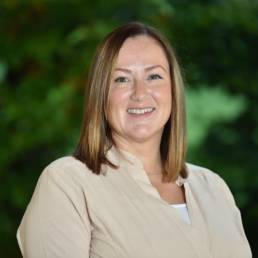An interview with
Giselle Clayton is an independent financial adviser (IFA) with Amber River True Bearing. Giselle likes to put her clients at ease so they feel comfortable opening up about their financial concerns so she can build a tailored plan that genuinely makes their lives better.
Financial planning, as Giselle Clayton from Amber River True Bearing explains, is about much more than balancing the books and managing investments. It's a comprehensive approach that weaves together the many threads of your financial life against the backdrop of your broader life goals.
Giselle says many of her clients are in their 50s and 60s approaching retirement when they first come to her for advice. “It’s at this age that people often find themselves juggling a complex mix of pensions accumulated over the years from many different employers,” she explains.
The challenge of financial planning lies in not only unravelling this tangled web but also aligning it with her clients’ dreams, aspirations, and the lifestyle they want when they retire. “It’s about making financial decisions that will ensure their golden years are as fulfilling and secure as they’d always hoped,” she says.
We asked Giselle about the role of a financial planner and what her clients can expect when they come to see her – or any other Amber River financial planner.
What happens in the initial meeting?
The initial consultation goes beyond numbers and charts. It will delve into your life story: your aspirations, fears, and the lifestyle you see for yourself in the years to come.
Your financial planner will want to understand the emotional aspects behind your financial goals, as well as your values and fears. Are you planning on retiring early? Are you seeking security, adventure, or perhaps a legacy to leave behind? They’ll also address any immediate concerns that might impact your financial well-being, such as outstanding debt, health issues, or a redundancy risk.
The planner-client conversation is a two-way street. Giselle believes in sharing some of her own life experiences, which helps open up the conversation. “This isn’t a one-off data-gathering exercise but an evolving dialogue,” she says, “so it’s good to build a rapport.”
This meeting will set the tone for a personalised plan – one that you believe in and, therefore, will be motivated to follow.
Why is it important to find an adviser you feel comfortable with?
Feeling at ease and having trust in your financial planner is paramount. Discussing finances can often be uncomfortable, even with people close to you, as it involves revealing personal details and, sometimes, vulnerabilities.
A successful financial plan requires an open, honest relationship where you feel comfortable sharing your life’s goals, worries, and even missteps. This rapport is crucial because the more your financial planner understands about you, the more tailored and effective your financial plan will be.
“Think of it as a counselling relationship,” says Giselle, “but for your finances – where sharing ‘uncomfortable truths’ leads to healthier financial habits and decisions.”

What will your financial planner ask you?
As well as the ‘soft facts’, like your retirement dreams and life goals, you’ll need to come armed with the ‘hard facts’. This may include details about your current wealth, income, expenses, debts, and other financial products you currently have in place.
Your financial planner is likely to open up discussions around other issues you may not have thought about yet. Any support you plan to give your children or grandchildren in the future, considerations for your later-life care if you ever needed it, and estate planning to manage inheritance taxes and legacies are just a few examples.
They’ll also want to understand how much risk you are willing – and able – to take with your money. This will be influenced by a range of factors such as your age and life expectancy, who else relies on your finances, and your capacity to absorb potential losses.
Beyond these fundamental factors, your personal risk preferences play a crucial role. Your financial planner will guide you through a series of questions that enables them to build up a clearer picture.
A financial plan tailored to your circumstances
Once your planner has all the information they need, they’ll start developing a tailored financial plan that’s unique to you.
One of the key tools they’ll often use is cashflow modelling software. Think of it like a really detailed budget planner for your future, that allows you to model different financial scenarios. It allows you and your financial planner to look at your current and estimated future income, outgoings, and investments, and spot areas that may require attention.
“Ultimately, it’s able to help you answer some big life questions,” explains Giselle, “like ‘do I have enough money for my future?’ and ‘when can I afford to retire?’.”
More than just financial advice
The holistic, objectives-based approach of financial planning goes beyond traditional financial advice. It’s about understanding your life’s goals and fears – and sometimes reconciling them with your financial realities.
“I often meet clients who can afford to retire but are held back by the fear of not having a steady income,” says Giselle. “I see my role as a blend of financial planner and life coach, offering reassurance and strategies to give them the confidence to embrace retirement.
“Conversely, for clients who might not have sufficient funds, my role is to provide honest, pragmatic advice. While this sometimes involves suggesting semi-retirement or exploring avenues like equity release, it always considers the long-term implications on a client’s lifestyle, quality of life and legacy.”
Giselle’s Top 5 Financial Life Hacks for a secure future
We asked Giselle for her top five financial life hacks that everyone should consider to build a balanced and prosperous life. Here’s what she told us:
1. Save some, spend some: Cultivate a balanced approach to finances. If you consistently set aside a portion for savings or investments, you’ll ensure you build up a cushion for the future while allowing you to enjoy the present.
2. Teach your children to budget: Financial literacy is a priceless gift to your children. Encourage them to understand the value of money, perhaps through earning their allowance and saving a part of it. This early education lays the groundwork for their future financial independence.
3. Join your employee workplace pension scheme: This is a win-win. You benefit from employer contributions, and the savings are tax-free. Opting out is akin to turning down a pay raise – it’s a missed opportunity to effortlessly grow your retirement fund.
4. If you’re self-employed, start a private pension: Self-employed individuals often neglect their retirement planning. Starting a personal pension offers numerous tax benefits and is critical for securing your future. The earlier you start, the better your prospects for a comfortable retirement.
5. Boost your pension whenever possible: If you find yourself with extra income or a windfall, consider boosting your pension. Given the tax relief on pension contributions, it’s one of the most effective ways to grow your retirement funds.
Turning your dreams into reality
Giselle sums it all up neatly: “Having enough money for retirement is important, but it’s really about making sure your money fits the life you want to live.
“Good financial planning is more than just a retirement fund. It’s about taking care of your family, making sure your loved ones will inherit what you want them to, and having a safety net in place for life’s unexpected turns.”
Get in touch
To talk to Giselle, or an Amber River financial planner in your area, or to arrange an appointment to discuss how we could help you, please call 0800 915 0000, or alternatively use our contact form here.
Disclaimer
The information within this article was correct at the time of publishing, but laws and tax rules are subject to change. Your circumstances and where you live in the UK may also have an impact on your tax treatment.
To learn about the government’s most recently-announced changes, please read our latest budget roundup: 2024 Autumn Budget Update
Related Posts
6 May 2025
Read More

26 March 2025
Read More

26 March 2025
Read More





